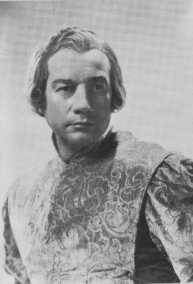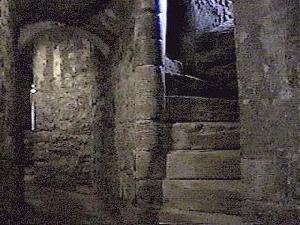Act III
 MS: Okay, the beginning: very animated and without any... any
depth. You come
as a happy young man. He has come running, you see: "Hey! I want to... are you
there?... Oh, Is that your hair I see?..." very little by little that... "Il y a
d'innombrables étoiles;" Already gets a little bit deep, huh?
MS: Okay, the beginning: very animated and without any... any
depth. You come
as a happy young man. He has come running, you see: "Hey! I want to... are you
there?... Oh, Is that your hair I see?..." very little by little that... "Il y a
d'innombrables étoiles;" Already gets a little bit deep, huh?
DC: Warm.
"...p. 117-118..."
MS: OK. Can we discard the "uhn"? "Que fait-tu la a la fenêtre en
chantant
comme un oiseau qui n'est pas d'ici?" As simple as possible and use your
lips.
"...p. 117-118..."
The voice needs absolutely no covering of any kind. It
needs a resonance, by
opening the back of the vibration of the tone, but the original vibration of the
tone should be as pure and devoid of any adornment as possible. "Que fait-tu la
a la fenêtre..."
DC: Yes, speech.
MS: The key please.
"...p. 117-120..."
Your voice is much more somber than the music.
DC: Still?
MS: "Il y a d'innombrables étoiles;"
DC: I'm trying to sing it too much I think.
MS: But what do you call singing? You call singing darkening?
DC: Producing. Maybe I'm... I'm putting too much effort into the
production.
 MS: You see, I'm sure I will be heard anywhere: Il y a d'innombrables
étoiles; je n'en a! jamals vu autant que ce soir;" And then this: "mais la
lune est encore sur la mer..." It has to be all that. "mais la lune est encore
sur la mer..." You are not in agreement with the music. Listen to the
music.
MS: You see, I'm sure I will be heard anywhere: Il y a d'innombrables
étoiles; je n'en a! jamals vu autant que ce soir;" And then this: "mais la
lune est encore sur la mer..." It has to be all that. "mais la lune est encore
sur la mer..." You are not in agreement with the music. Listen to the
music.
"...p. 119..."
DC: Shimmering.
MS: Shimmering, yes.
"...p. 119-120..."
Don't you see the difference?
DC: Yes.
MS: You must absolutely sing it with this voice. You have more brilliance in
the voice. I don't care at all for the volume if I have brilliance.
DC: 'Cause that would carry and you wouldn't need volume.
MS: Yes.
"...p. 120-121..."
You see, that would be perfect if you would remove some of the muscles around the
voice.
DC: Explain.
 MS: I hear muscles. "plus près de toi." Why? "plus près de toi."
The tone on "Mélisande" was beautiful. "Mélisande." It has to be
smoking from you, it must not be... 'Penche-toi un peu."
MS: I hear muscles. "plus près de toi." Why? "plus près de toi."
The tone on "Mélisande" was beautiful. "Mélisande." It has to be
smoking from you, it must not be... 'Penche-toi un peu."
"...p. 120-121..."
That was already better. Don't have any preoccupation about a bulk in this
role.
DC: About a ... ?
MS: A bulk of voice.
DC: A bulk of voice, yes.
MS: Now, may I rearrange your body a little.
Lift your torso. More than that. Open your shoulders.
Try it. Now, sing on that type of strength, a strength which would be coming
from here (chest) and not from here (throat). And you see, I see
why you are... you see me... something in you is kind of shivering in here. This
way, you create a certain intensity which is praiseworthy, absolutely necessary,
but it is not a freeing, liberating intensity. It is a mastering
intensity.
DC: Mustering.
MS: No, mastering your voice. Let's try... from the same place. No, can we
have it from "Il y a d'innombrables étoiles;"
"...p. 119..."
MS: Why like this? "Il y a d'innombrables étoiles; Il y a d'innombrables
étoiles;" Why? The voice has to be free, it should not be mastered.
"...p. 119-121..."
I like it very, very much. Don't you see?
 There is no necessity all the time to impose upon the
vibration of the voice a pressure from here (throat). Not at all; it has
to exist. If you sing very plainly in your mouth, the vibration of the voice
will find, by itself, a way to penetrate into whatever upper resonances are
necessary for completing the tone... completing the tone. Totally, all we need is
resonance. If you try to force the original resonance, somehow it will fail to
enter all the upper ones which would be reached if it were free. It's like
somebody would... you see, I always try to make comparisons. I remember the
first year I came here which was in 1950 (which was not here; it was in
Carpinteria; it was the same organization). We had a cellist who was a very
excellent musician and very lovable person and he played extremely strong, you
see. And it was very impressive near; near him.
There is no necessity all the time to impose upon the
vibration of the voice a pressure from here (throat). Not at all; it has
to exist. If you sing very plainly in your mouth, the vibration of the voice
will find, by itself, a way to penetrate into whatever upper resonances are
necessary for completing the tone... completing the tone. Totally, all we need is
resonance. If you try to force the original resonance, somehow it will fail to
enter all the upper ones which would be reached if it were free. It's like
somebody would... you see, I always try to make comparisons. I remember the
first year I came here which was in 1950 (which was not here; it was in
Carpinteria; it was the same organization). We had a cellist who was a very
excellent musician and very lovable person and he played extremely strong, you
see. And it was very impressive near; near him.

But once, I heard him in Los
Angeles playing in a large hall: he had an extremely small tone. When I was
in... with the Teatro Colon in Buenos Aires in 1936, that first year, Casals came
and gave eight recitals in the Teatro Colon, some of them solo (Bach partitas and
then Turina, and solo). I was on stage and decided to see the man come in and I
saw this little man come in with his cello and then he stopped. And I ran and
ran and ran and went to the fourth gallery. And he started playing. "Zzzz zzz
zzzzzzzzz." It was buzzing in back of my ears in the fourth gallery. It's the
same process: Whatever muscles we use here (throat) kill the voice. We
have to get the whole energy for singing from the middle and lower part of our
body. The raised torso acts as an added resonator, and also prevents you from
using any pushing strength. The strength of the singer is a kind of absorbing
strength. It doesn't push, it receives. Maybe you will... all, all...
everything you do is extremely good and you will be a Pelléas, but I don't
want you to be a somber Pelléas. Let's go on.
 IB: We'll go on, yes.
IB: We'll go on, yes.
"...p. 121-122..."
MS: "Je pars ce soir." Sorry.
"...p. 122-123..."
"...main sur mes lèvres." She will not be tempted at all if you do this
"lèvres".
"...p. 122-127..."
Excuse me, excuse me. "tes cheveux descendent vers moi!"
DC: I've heard every single recording. They all sing - not that that makes it
right - "tes cheveux descendent vers moi" It's printed in the score that way, I
know. I've never seen the manuscript.
IB: The full score has DbDb - F. You showed me.
DC: The International. Now, I'd like to see the manuscript. That's what's
printed.
MS: "tes cheveux descendent vers moi!"
IB: Do it anyway you like. That's too fast, I'm sorry.
DC: It's just a little.
MS: And here, obviously, you are given a lot of time. You see, "Oh, oh."
"...p. 127..."
The whole thing is that I would like all that to take off, to take off very much.
It doesn't take off, you see. "Toute ta chevelure, Mélisande, toute ta
chevelure est tombé de la tour!" All that should be much more superficial.
Maybe you will hate me for saying that.
DC: No, no, no, no, no. It's... I think it's... it's a simple thing of being
afraid of that G that's coming.
MS: But the... but the... but the...
`
the slimmer you will be before, the easier the
G.
DC: I... that's true. That's what you just pointed out to me.
It'sjust...
MS: Sure.
IB: You wanna try that? "Mélisande."
DC: If 1just forget about the singing...
MS: And you work so much here.
Dork - be. We don't have to work - we are. But
don't push it. You see, this is the biggest muscle in the whole body, the
trapezius muscle. It covers the whole back. The moment you put this muscle in
action against the voice, everything is tight. You have to dispose of it and not
ask for it the... from it the power to make the voice ring. If you are away from
it, the voice... the voice will ring by itself.
 Let's see. Let's have "Oh! oh!"
Let's see. Let's have "Oh! oh!"
"...p. 127..."
Yes, yes. There, there, there. No, that was an accident. It was not an
error.
DC: Slower.
MS: It was not an... it was not an error of technique. There, you sang
it.
DC: "tour"
MS: Well, 1... uh... am afraid we are going to hear some of this." But, uh,
uh...
"...p. 127..."
DC: Question: It doesn't sound...
MS: Not at all. It seems disengaged from you.
DC: OK. Fine.
MS: Our voice must sound disengaged form
ourselves.
DC: It always sounds different to people than it does...
MS: Oh, yes. Once again.
DC: Once again? No, let's not.
MS: If you have my pirated recording, you will say that I
hold this note much too long.
DC: Forever. I know.
MS: Yes, because it was so good, I...

"...p. 128..."
MS: "Je les tiens dans les mains, je les tiens dans la bouches...
DC: Up and out.
MS: Yes. And you are... you are... she's there at the balcony, you see. This
for convenience you have taken her hair...
DC. Yes.
MS: ... and you sing to the public. Of course, and you sing this way. See, you
have the hair here and... she's there and you sing there but she's there but...
it is not this way. You see, you lean forward in singing.
Never lean forward in singing. You must dominate the
public. The farther away from the public you put yourself, the more you dominate
the public. This is sign... sign of insecurity of immaturity if you go to the
public. Stay away from the public. The worst place on the stage is at the
footlights. The best place on the stage is about 6 feet, 7 feet from the
foodight(s) and then up; up more. At the footlights, you are dead. You cannot
do anything. There is this sense of space.
 "...p. 128..."
"...p. 128..."
You have taken off. You have taken off now. No more on the ground. You have
taken
off. So far you have been constantly... Yes. Do it again. "Je les tiens dans
les mains,"
"...p. 128-131..."
I know where we are heading.
IB: Right.
MS: OK? Now, will you please sing "les tenir;", not "tenir;"
The more you want to go high, you... the more you must sing
a slim vowel.
DC: OK.
MS: "mes deux mains ne peuvent pas les tenir;"
IB: "Tu Vois.'
"...p. 130..."
MS: Don't start heading forward. "Tu vois, tu vois?..."
DC: It's against the tower.
IB: Yeah, lean back.
"...p. 130-131..."
MS: It's a little bit dangerous, the way it is, isn't it?
DC: Well---.
IB: Help.
DC: Help. Tell me.
MS: But it's "ils m'aiment," not "iIs m'aiment," "iIs m'aiment,"
DC: You know, I've really never sung that.
MS: "é" "et - ils - m'aiment,"
DC: "et ils maiment,"
MS: No, "et lls m"ai" "et ils m'aiment,". "é"
The vibration of the voice comes from below; it's very slim
and it ends the vowel ee here, and the vowel, it ascends into the vowel ee. "et
ils m'aiment,"
 DC: Let me hold the F# for a second and then go to the A.
DC: Let me hold the F# for a second and then go to the A.
MS: Alright.
IB: Do it once free, by yourself.
DC "et"
MS: Wrong, wrong position. "et". You breathe and you do this. "et", "et".
DC: "et ils mai-"
MS: "m'aiment,"
Not "ma", "m'ai". And nearer to
é.
"et ils m'aiment,".
DC: The "m'alment," nearer to é.
MS: Near to é, not to è.
By the way, there is no law, you see. I don't know how they
are now, but for a time, about the time I left France, the whole Comédie
Français was saying, "Je t'éme" "tu mémes."
IB: All closed e's.
MS: All closed. "je t'éme."
IB: Is it easier to sing?
MS: No, I hate that.
But now, for singing a very high note, we must do what all
instruments do: we must find a slimmer tone.
DC: Narrow.
MS: Not narrow. I'm very... with all my... my strange
English, I'm extremely precise in my words. To me, slim means something which is
slender but untouched. Narrow means something which is
squeezed.
 DC: Two years ago, when I did the end of the fourth act, at
the dress
rehearsal of the scene, I asked von Stade to come and she said after the
rehearsal, she said, "Just keep it slender."
DC: Two years ago, when I did the end of the fourth act, at
the dress
rehearsal of the scene, I asked von Stade to come and she said after the
rehearsal, she said, "Just keep it slender."
MS: Yes. "Snello." The Italians, the Italian teacher
will tell you all the time, "snello." "Canta snello."
"...p. 131..."
MS: Yes, but it will come. But this way, you can have a
certain... a certain security with it, but this "et ils m'al-". And besides
that, we want a violin top on "et ils m'aiment,".
DC: (violin sound)
MS: Right.
IB: We'll skip that now.
DC: Shall we go on?
IB: We'll go on. Yea? Yes? We'll go on. OK.
"...p. 131..."
MS: You see, you see.... I wish I heard in your voice more sympathy for
Mélisande.
DC: Oh, I'm sorry.
MS: "ils m'aiment plus que toi!..."
DC: "ils m`aiment plus que to!!..."
"...p. 132..."
MS: Beautiful! Sing like that.
"...p. 132-133..."
"j'embrasse tes cheveux...", "chevah..." You see, I wish....
I don't understand this.... superstition that, -to be a
successful singer, you have to sing the high tones bigger than the others. It's
certainly unprofessional. Some people seem to manage to do it, but most don't.
"j'embrasse tes cheveux...". "-veux" "-vah'.
"...p. 133-134..."
DC: I'm not used to it. I can sing it.
MS: At the moment, no, it's not that. At the moment, you have the impression
that I bring limitations to your voice.
DC: Limit ... ?
MS: That I bring limitations to your voice.
DC: No, I can sing it, I said. I'm not used to it, but I can sing it.
MS: Now, I don't want you to sing it if you don't feel it is an improvement.
DC: Sans doute.
MS: Yes, yes, but for the moment, I have the impression that you think I find
this much more limited than what you did.
DC: No, well... it's only because it's so different. It doesn't mean that it's
right (the old way)
 MS: Yes, but I wish that you really would try to memorize
this type of sound and use it
throughout the opera. But maybe in some places in the fourth act that you can
"ah" but
not until there. It has to be melodic constantly, not having any
--?--.
MS: Yes, but I wish that you really would try to memorize
this type of sound and use it
throughout the opera. But maybe in some places in the fourth act that you can
"ah" but
not until there. It has to be melodic constantly, not having any
--?--.
I wish we do that again. "Je les tiens,". No, no, no.... I
mean... uh, oui, "je les noue."
"...p. 133..."
No, but I have no voice left, no strength for singing. But,
I want this vi-... vibrato in the voice, this intensity of... of life which
cannot be with a "j'embrasse tes cheveux."
DC: Yes.
MS: Let's try. "je les noue,".
"...p. 133-134..."
Why do you open the mouth "m'abandoner" "m'abandoner." I
don't know of any place where the voice is ever held on to.
"...p. 134.."
"m'abandoner..."
"...p. 134..."
And now, what you...
what you must then add then to your training is to
consolidate the two ideas. The idea which is behind (which I believe to be the
truth), especially in this part, of the vibrant slim tone, but which then is
doubled by a large opening in the back. A comparison which I have used sometimes
is when you note, those bulb lamps they had in the country, in the parks and so
forth. But there is a plate with a rim and then... old lamp and parabolic
mirror. Now, we have it here. Here (above upper lip), is the lamp, here
(top/back of the head) is the parabolic mirror. Sing the lamp, open the
mirror, but don't sing the mirror.
"...p. 134..."
Open the mirror. Open the back as much as you want, but
don't send the vibration into this open space. It stops. It stops vibrating.
Clearer?
 DC Yes.
DC Yes.
"...p. 135-138..."
MS: "Que faites-" Tibbett... Tibbett on the old recording: "Que faltes-vous
ici?".
"...p. 138..."
Vous êtes des enfants, Mélisande."
DC: Shall we...
]B: You want to do this?
DC The next one?
MS: Does this upset...
DC: Yes, I have to do a lot of...
MS: You want to stop a second and reflect? What... what is the danger in
trying to apply a little bit what I am asking you to do?
DC: Well, as you said yesterday, you have to fit the
technique... fit the technique to the music. Right?
MS: Right. You have... you have to have a different voice for every page. You
have a different voice for every song.
DC: But...
MS: You see, you cannot use... you...
you have a very good voice. God knows I'm not going to...
to... to discuss it and criticize your voice. But it has to be somehow a little
bit modified in order to fit the spirit of this particular
part.
DC: Due to the difference of this role with any other
baritone music,...
MS: Yes...
DC: I should... should I... I shouldn't sing any other
role like this role...
MS: No.
DC: OK. That's...
MS: No, it's always different.
DC: Yes, since this one is so different from any other baritone
role.
MS: Yes. Right, right. I showed you when I say this...
when I start to sing
the... "Grand-pêre, j'ai
re#231;u, en même temps que la lettre de mon frère," And you must
immediately define yourself. That's the way Pelléas is. That's the voice
of Pelléas. And as I sometimes...
I say. 1Is est vral que ce chciteau est tr~s sombre... Ils est trés froid
et trés profonde." That's the voice of Golaud. But both are my voice. But
it's my voice for Pelléas and then my voice for Golaud. So you must use
your voice, which is excellent, with the idea that you try to turn it in this
part towards a slimmer vibration which brings it immediately a little nearer to
the tenor sound and allow you to reach the height without any trouble. I don't
know how Jean Perier did it, the creator, who was... a... a regular baritone. He
was not at all a special baritone. I don't know how he did it, but he must have
found a way. As we said yesterday, he didn't sing the A's.
 DC: No, no. Did Panzéra sing the role?
DC: No, no. Did Panzéra sing the role?
MS: On the stage?
DC. Yes.
MS: I cannot answer that. I doubt it.
DC: I don't think so. I'm wondering.
MS: I know that Bernac just sang it once in a... in a
performance sponsored by Ganna-Walska. I told you about the... the Ganna-Walska
Opéra in Paris. Once, not... not that he was bad, but uh... the production
no... not bad... he was never asked to do it.
And you see... and I don't want to say anything that Souzay would
reproach me. Souzay's convinced that I have ... that I have tortured his career
because once I told a class that he did not have the voice ... the real voice for
Golaud. So after that, he wrote me a furious letter. It was reported to him.
He wrote me a furious letter saying I cannot understand how a man of my
reputation as a singer and as a man would want to undermine the career of a
younger singer, which I reported to Bernac, who then said, "Again."
IB: The scene in the grotto. Is that important for you?
DC: Yes. That's a very... that's a very "singy scene.
IB: This. I meant "Si, une fois, dans le temps,".
DC: Oh that... oh, in the grotto... out of the grotto...
IB: When you come out of the grotto.
MS: Oh yes... yes... "Et maintenant, tout..."
DC: "Ah! Je respir enftmf..."
MS: "Ah! Je respire enfin!..." "Et maintenant, tout I'air de toute la mer!..."
And here you must absolutely feel like a tenor. Yes. "Et
maintenant, tout I'air-" Sing here. "...tout I'air de toute la mer!" Why do
you think the tenors do that all the time? Let it ascend and you will have the
timbre. Let it ascend...
"...p. 149-150..."
If, in this score, you will... you will stop being 100% one
minute, it's lost.
 DC: I'm sorry.
DC: I'm sorry.
MS: 'You have to be 100%. You cannot just pass, as you see. OK. "Ah! Je
respire enfin!..."
"...p. 149..."
"j'ai été sur le point de tomber..."
"...p. l49-150..."
Open up. Open up.
"...p. 150-151...
Fine. But you see, even now, that I have started toying
with your physique, and positions, you can sing your low notes that way.
"...pâte empoisonnée... Et maintenant, tout l'air de toute la
mer!..."
Your voice is... let's see... "Et maintenant,"
"...p. 149-154..."
Make this much more lighter. There are the bells. So
your voice must be... be attuned to the bells.
"...p. 153-154..."
DC: Let me do it again. I'm sorry.
IB: Right. Good. Maybe I'm rushing you a little bit too much. Or is it
easier if it's faster?
DC: I should just know it better.
Return to the only
opera
Go to Ope-ra
Go back to the HomePage
